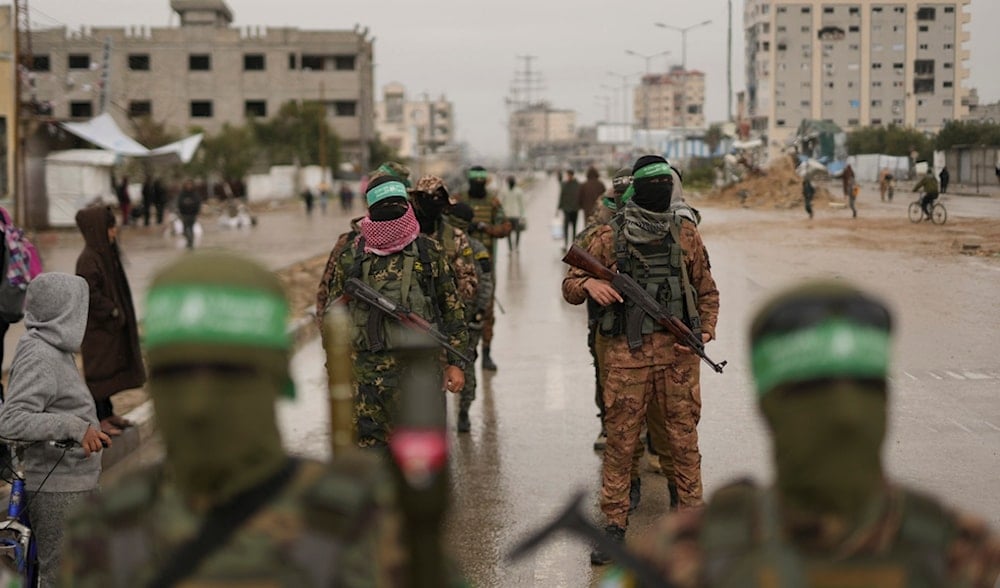'Israel' did not defeat Hamas, it certified them: National Interest
Despite two years of devastating Israeli aggression, Hamas remains active in Gaza. This TNI analysis explores how flawed Israeli strategy allowed the group to survive.
-

Hamas fighters take position ahead of the planned release of Israeli captives set to be handed over to the Red Cross in Nuseirat, Gaza Strip, Saturday, Feb. 22, 2025 (AP)
"Israel" still insists on achieving a so-called complete victory in the Gaza Strip despite signing a ceasefire agreement last week, which brought the besieged strip long-anticipated calm after two years of genocide. But as the occupation says it intends to destroy the Resistance movement Hamas, reports show that the Resistance group has emerged with at least 15,000 armed fighters ready to reassert order in Gaza.
An op-ed by Azeem Ibrahim, published in The National Interest, explains that experts have long affirmed that Hamas cannot be eliminated by military pressure; targeting its leadership has proven vain as long as organized cells continue to operate, given that Hamas is deeply ideologically and politically entrenched in ordinary Palestinian society. This has been proven in precedent in US operations against Al Qaeda and ISIS. "You can kill leaders, dismantle infrastructure, and occupy territory, but you cannot bomb away an idea," Ibrahim stated.
"Israel", Ibrahim argues, has empowered Hamas through the complete devastation of the Gaza Strip. Over two years, the Israeli military destroyed infrastructure, killed tens of thousands of Palestinians, and displaced at least a million. However, these same conditions of destruction and despair initially gave rise to Hamas, and are now more tangible than ever, empowering the Resistance group.
The root of Hamas' rise to power
To understand Hamas’s staying power, one must revisit the movement’s rise in the early 2000s. At the time, the Palestinian Authority under Fatah was associated with corruption and incompetence.
Years of stalled negotiations, worsening economic conditions, and the ongoing expansion of Israeli settlements led many Palestinians to lose faith in the PA.
In this context, Hamas presented itself as a disciplined and effective alternative, a resistance movement promising justice and dignity. Its victory in the 2006 Gaza legislative elections reflected popular frustration, not necessarily widespread support for Islamist ideology.
A major contributor to Hamas' resilience in Gaza is also "Israel's" political failures, as much as it is military miscalculations.
Read more: Israeli media, officials acknowledge failure in war on Gaza
'Israel's' strategic failure
Under Prime Minister Benjamin Netanyahu, policies aimed at keeping Palestinians politically fragmented proved short-sighted and destructive. By quietly tolerating Hamas rule in Gaza while undermining the Palestinian Authority in the West Bank, "Israel" ensured that the Palestinian national movement remained divided and disempowered.
According to Ibrahim, this Netanyahu strategy served immediate political goals by making so-called peace negotiations nearly impossible. A fractured leadership meant no viable two-state solution could move forward. Meanwhile, "Israel" expanded settlements and deepened occupation with impunity.
But the consequences are now being felt. Hamas’s October 7 operation shattered "Israel’s" security assumptions and triggered a catastrophic war. Despite relentless military campaigns, the group remains operational and its ideology untouched.
Read more: Hamas hails prisoner release as national milestone for Palestine

 3 Min Read
3 Min Read









